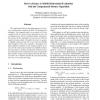Free Online Productivity Tools
i2Speak
i2Symbol
i2OCR
iTex2Img
iWeb2Print
iWeb2Shot
i2Type
iPdf2Split
iPdf2Merge
i2Bopomofo
i2Arabic
i2Style
i2Image
i2PDF
iLatex2Rtf
Sci2ools
ARITH
2007
IEEE
2007
IEEE
How to Ensure a Faithful Polynomial Evaluation with the Compensated Horner Algorithm
The compensated Horner algorithm improves the accuracy of polynomial evaluation in IEEE-754 floating point arithmetic: the computed result is as accurate as if it was computed with the classic Horner algorithm in twice the working precision. Since the condition number still governs the accuracy of this computation, it may return an arbitrary number of inexact digits. We address here how to compute a faithfully rounded result, that is one of the two floating point neighbors of the exact evaluation. We propose an a priori sufficient condition on the condition number to ensure that the compensated evaluation is faithfully rounded. We also propose a validated and dynamic method to test at the running time if the compensated result is actually faithfully rounded. Numerical experiments illustrate the behavior of these two conditions and that the associated running time over-cost is really interesting.
Applied Computing | ARITH 2007 | Classic Horner Algorithm | Compensated Horner Algorithm | Condition Number |
| Added | 02 Jun 2010 |
| Updated | 02 Jun 2010 |
| Type | Conference |
| Year | 2007 |
| Where | ARITH |
| Authors | Philippe Langlois, Nicolas Louvet |
Comments (0)

